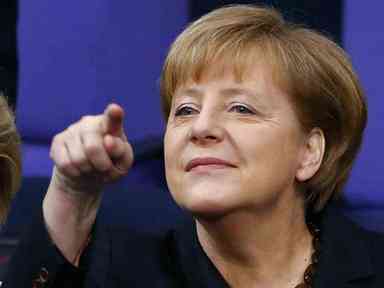George Packer on Merkel:
‘In November, 1999, the C.D.U. was engulfed by a campaign-finance scandal, with charges of undisclosed cash donations and secret bank accounts. Kohl and his successor as Party chairman, Wolfgang Schäuble, were both implicated, but Kohl was so revered that nobody in the Party dared to criticize him. Merkel, who had risen to secretary-general after the C.D.U.’s electoral defeat, saw opportunity. She telephoned Karl Feldmeyer. “I would like to give some comments to you in your newspaper,” she said.
“Do you know what you want to say?” Feldmeyer asked.
“I’ve written it down.”
Feldmeyer suggested that, instead of doing an interview, she publish an opinion piece. Five minutes later, a fax came through, and Feldmeyer read it with astonishment. Merkel, a relatively new figure in the C.D.U., was calling for the Party to break with its longtime leader. “The Party must learn to walk now and dare to engage in future battles with its political opponents without its old warhorse, as Kohl has often enjoyed calling himself,” Merkel wrote. “We who now have responsibility for the Party, and not so much Helmut Kohl, will decide how to approach the new era.” She published the piece without warning the tainted Schäuble, the Party chairman. In a gesture that mixed Protestant righteousness with ruthlessness, Kohl’s Mädchen was cutting herself off from her political father and gambling her career in a naked bid to supplant him. She succeeded. Within a few months, Merkel had been elected Party chairman. Kohl receded into history. “She put the knife in his back—and turned it twice,” Feldmeyer said. That was the moment when many Germans first became aware of Angela Merkel.’
(…)
‘
Those who know Merkel say that she is as lively and funny in private as she is publicly soporific—a split in self-presentation that she learned as a young East German. (Through her spokesman, Merkel, who gives few interviews—almost always to German publications, and all anodyne—declined to speak to me.) In off-the-record conversations with German journalists, she replays entire conversations with other world leaders, performing wicked imitations. Among her favorite targets have been Kohl, Putin, King Abdullah of Saudi Arabia, former Pope Benedict XVI, and Al Gore. (“Ah have to teach mah people,” she mimics, in a Prussian approximation of central Tennessee.) After one meeting with Nicolas Sarkozy, the French President, during the euro crisis, she told a group of journalists that Sarkozy’s foot had been nervously jiggling the entire time.
Schlöndorff once asked Merkel what she and other leaders discuss during photo ops. The Chancellor described one such moment with Dmitri Medvedev, who briefly interrupted Putin’s fifteen-year reign as Russia’s President. She and Medvedev were posing for the cameras in Sochi when, gesturing toward the Black Sea, she said, in the Russian she had learned from Frau Benn, “President Putin told me that every morning he swims a thousand metres out there. Do you do things like that?” Medvedev replied, “I swim fifteen hundred metres.” To Schlöndorff, the story showed that, “even when she is involved, she is never so totally involved that she could not observe the way people behave and be somehow amused by it.”
“She is a master of listening,” the longtime political associate said. “In a conversation, she speaks twenty per cent, you speak eighty per cent. She gives everybody the feeling ‘I want to hear what you have to say,’ but the truth is that her judgment is made within three minutes, and sometimes she thinks another eighteen minutes are wasted time. She is like a computer—‘Is this possible, what this man proposes?’ She’s able in a very quick time to realize if it’s fantasy.”’
Read the insightful article here.
The decency of Angela Merkel is confirmed in this article. As far as politicans can be decent, Coetzee wrote that politics brings the worst out in people. But it’s clear that Merkel understands power and that her decency is based upon pragmatism. The word ‘opportunist’ as been used in the article.
Her economic policies, her insistence on austerity, are her weakest point, but after reading the article I understood that she may not believe in austerity herself, she just followed the polls.
Merkel remains the best hope for Europe. A Messiah you can believe in must be a decent opportunist.
